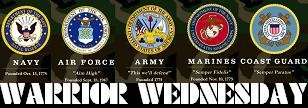Deciding Which Military Service To Join

First and foremost, you should decide if you should even join the military. the military is not for everyone, and some people find that out too late. Ask yourself why you want to join the military? Do you need a job? Do you want to serve your country? Are you thinking of making the military a career, or just do a term or two? Is it for the college benefits? Is it to learn a trade? Do you want to travel the World for awhile? Just need some time to "mature?"
The Marines are, without argument, the most "military" of all the services. If you join the Marines, expect to eat, sleep, and breath "The Corps," 24 hours per day, seven days per week. All Marines are considered a "rifleman" first, and whatever other MOS (Job) they hold second. This is attributable to the high level of marksmanship training that all Marines receive. The Army is probably the second most "military." Many Army Combat Arms units, such as the elite Rangers, are just as intense and "gung ho" as the Corps. The Navy, while not as "rigid" as the Marines and Army, has many deep-set customs and traditions which are immobile. For the "gung-ho" sailor, the Navy possesses, probably the best-known special operations force -- the Navy SEALs. The Air Force, tied with the Coast Guard, as the "least military" service, also has it's share of "gung ho," in the the elite Combat Controllers and Air Force Pararescue forces. For more information, see Special Operations Forces. (Note: Recruiters see lots of folks who want to enlist and serve in one of these elite fields. The truth of the matter is that most people who apply for the "elite" programs wash out due to the very rigorous training requirements. If you enlist to become one of these "elites," and you wash out of training, you don't get to quit. You'll be required to serve the remainder of your enlistment contract in a different job). If you like shooting (a lot), and want a complete change of lifestyle, to include a deeply ingrained pride of service, commitment, and sense of loyalty, the Marine Corps may be just what you're looking for. This may be a minor point, but it is very telling: When you ask an airman what he does, he will respond, "I'm in the Air Force." When you ask a sailor what he does, he will respond, "I'm in the Navy." If you ask a Marine what he does, he'll say "I AM a Marine."
If you want a little more flexibility in your lifestyle, but still want a strong sense of being in the military, the Army may be for you. If you like to crawl through the mud and blow things up, using the latest and greatest of "blowing up toys," consider one of the Army's combat arms branches. You'll likely get all the time "in the field," that you want.
The Navy is probably the best place for those who like to travel -- a lot. There are few ratings (jobs) in the Navy that won't spend a significant amount of time at sea. This might be great if you are single, but might be something you'll want to think about if you have a family.
The Coast Guard has the advantage of having a real, "peacetime" mission, in active law enforcement, rescue, and ocean safety. On the "down side," the Coast Guard only has 23 enlisted jobs to choose from, and you usually cannot get a "guaranteed job" at the time of enlistment. On the plus side, pretty much all of those jobs directly relate to the civilian job market. Additonally, with fewer jobs, the Coast Guard doesn't "specialize" as much as the other services, and one may get a wider range of experience within a specific job.
Of all the services, the Air Force is probably the most (but not exactly) like having a regular job. The Air Force is far ahead of the other services in many "qualify of life" issues such as dormitories and base housing units.If these things are important to you, then the Air Force should be something you look into. However, in terms of educational requirements and overall ASVAB (Armed Forces Vocational Appitude Battery) scores, the Air Force (tied with the Coast Guard) is the hardest service to get into.
National Guard and Reserves. All of the services have a reserve component and two of the services (Army and Air Force) have a related National Guard, as well. The primary purpose of the Reserves and National Guard is to provide a reserve force to supplement the active duty forces when needed. The biggest difference between the Reserves and National Guard is that the Reserves belong to the federal government, while the National Guard belongs to the individual state government. While both the Reserves and the National Guard can be called to active duty by the Federal Government, under the authority of the President, individual state governors can also call out their National Guard units to assist in individual state emergencies. Following basic training and job training, members of the Reserves and National Guard drill (perform duties) one weekend each month, and two weeks every year. However, it's become more and common to activate Guard and Reserve units to supplement active duty deployments to such garden spots as Iraq, Kuwait, Bosnia, and Kosovo.



















<< Home